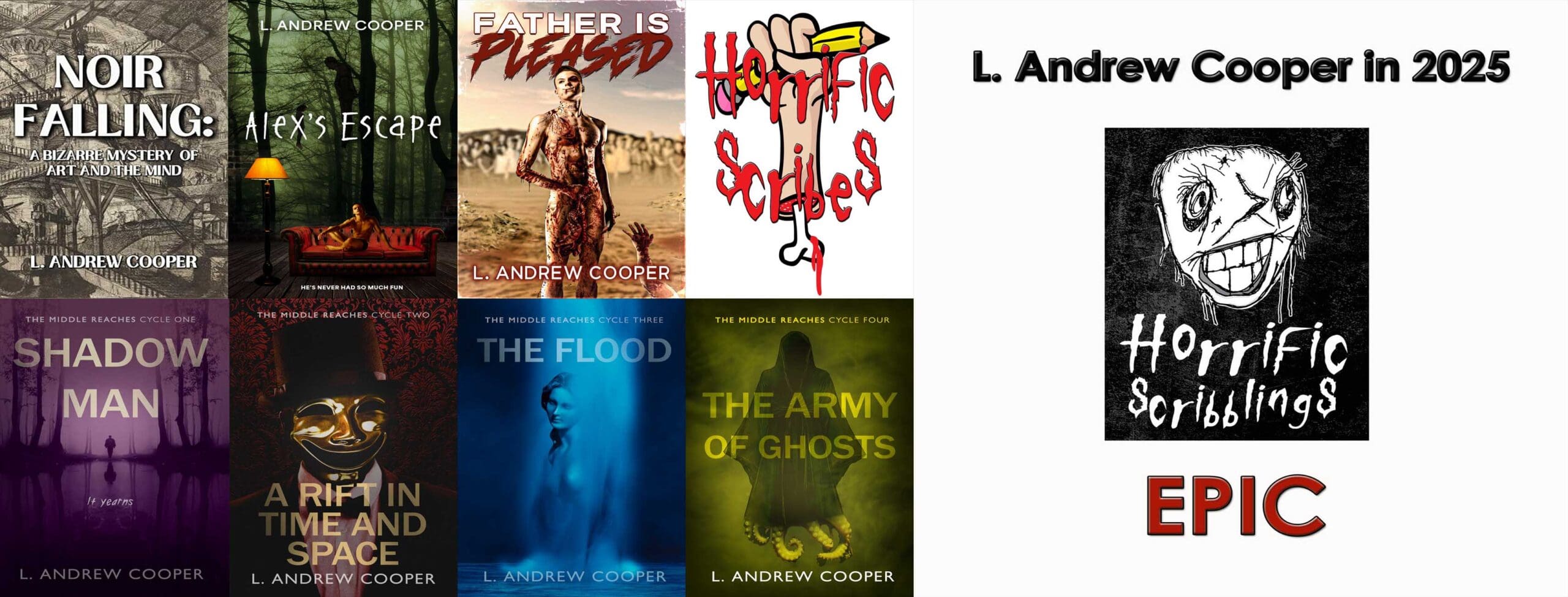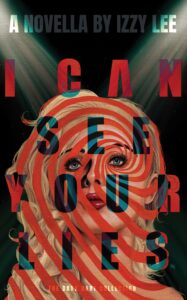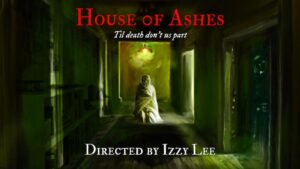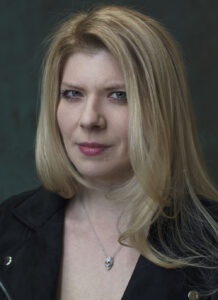Interview with Author Izzy Lee: I Can See Your Lies (2024)
Author and filmmaker Izzy Lee discusses her debut novella I Can See Your Lies, which is already turning heads, and takes us into a world that blends Gothic horror with Hollywood noir intrigue and psychological torment.
I Can See Your Lies
Fin’s reality is crumbling. Her husband has abandoned her, she’s now a single mom to a nine-year-old daughter, her Los Angeles home is sweltering, and she’s being haunted by disturbing hallucinations that make life a waking nightmare. Are the visions a product of stress, trauma, psychosis, or something else? The answers to those questions become clearer when Fin starts digging up dark secrets connected to her mother’s cold-case disappearance, a once-rising actress who mysteriously vanished in 1979. Will Fin slowly unravel the truth? Or will it remain hidden forever beneath the glitz and glamour of illusion?
The Interview
1) Seeing Lies. Fin, your protagonist, seems able actually to see when a person is lying because a liar’s face changes rather grotesquely. Why does Fin’s ability manifest in the way that it does (yours to reveal… or not)? For Fin, is the difference between lies and truth black and white, or does her way of seeing acknowledge matters of degree? While much of the story involves conflicts in which abusive, controlling men are at fault, Fin’s ability, which she considers a “curse,” is passed along her family’s maternal line, and she has given a version of it to her daughter. Why is the ability to see truth passed among women?
IL: When people live in a world that’s made to hold them down with outright discrimination and in subtler ways, perhaps they develop special abilities. These abilities are not only a spotlight into the glaring system bias and disgusting behavior society has put in place as defaults–favoring the rulers of a culture made by and for themselves–but a protection. It’s the same rule that states the smarter you are, the more depressed you’re likely to be, because you see what’s happening in the world on the macro and micro level. You cannot avoid it, as much as you’d like to. A double-edged sword.
2) “Ever been othered.” At one point, experiences with men lead one female character to state that suffering from male coercion is the “story of every woman’s life,” which suggests the book might have at least some “everywoman” potential in its narrative. Is that right? Why or why not? In your “Acknowledgments,” you go further, writing that the book is for anyone who has “ever been othered,” which means a lot of people. Why so ambitious? How does the book work toward such ambition?
IL: There are a lot of hurt people in the world who need healing. I don’t think that’s ambitious, but human and empathetic.
3) Classic Gothic I: The Patriarchy. With its early horrors of a father imprisoning a daughter for daring to tell the truth about what she sees and a husband whose abuses seem to edge closer and closer to murder, I Can See Your Lies taps into the deepest veins of traditional horror, the first Gothic novels like those by Ann Radcliffe in the 1790s featuring young women trapped in castles by scheming male tyrants as well as descendants such as Charlotte Perkins Gilman’s “The Yellow Wallpaper” (1892). Were you conscious of this tradition as you wrote, and if so, how did it affect your writing? As far as the horrors of the patriarchy are concerned, do you think much has changed since the 1790s? Why or why not?
IL: There isn’t much that has changed, no. Some of the details and systems are different, and while there have, of course, been huge strides made in the last few centuries, you can’t tell me that a pink razor that costs a dollar more than a gray or blue one isn’t blatant sexism. It’s called the “pink tax.” It’s also why women’s dry cleaning and haircuts are more expensive, etc. etc. etc. Women still make on average 18 cents less than any man in the same exact position. It’s vulgar.
As for the Gothic, I’ve always been drawn to it, because I find these kinds of stories so relatable. Did I set out to write a Gothic tale? No. But the parallels are there because that’s the kind of life I’ve been subjected to. Fun times!
4) Classic Gothic II: The Manuscript. The first Gothic novel passed itself off as a rediscovered older manuscript, and after that Gothic/horror stories in print never really got over making manuscripts and books integral parts of their plots. So, too, I Can See Your Lies: Fin develops a riveting relationship with her missing mother’s diary, which is integral to multiple intertwined mysteries. Again, were you conscious of this manuscript tradition as you wrote, and if so, how did it affect your writing? How do you think your audience’s reading experience relates to Fin’s reading experience? How do you expect Fin’s reactions to the diary affect your audience’s reactions?
IL: I wrote this book almost as a stream of consciousness. It just came pouring out of me without any plotting, outlines, or thinking about any kind of works or traditions. I don’t know much about my readers’ reactions yet, except through reviews and some press I’ve gotten. Generally, women really relate to this book. I’m happy that it’s making an impact, that readers find it to be a realistic portrayal of a woman’s experience. It also makes me sad that what I’ve written is so familiar an experience. This society is garbage.
5) Hollywood (Neo-)Noir. Fin “found the Hollywood machine repellant to anyone with a soul.” Gothic isn’t the only supplier for the I Can See Your Lies cocktail: especially in the storyline involving older (as the 1970s isn’t quite “Old,” though you do capture that vibe) Hollywood, you play with noir figures, brooding, possessive men, the women they can’t resist, and the sex everyone’s having that seems to tempt violence at every turn. What drew you to such a representation of Tinseltown? To what extent does it reflect your actual feelings?
IL: I’m a big fan of noir and neo-noir stories and films, along with Gothic works. I think that one’s deepest influences cannot be separated from their creations. As for Hollywood? It’s a cruel god. The sun can shine on you one day, and the next, there’s an earthquake that’s destroyed you. There’s always a dark side to the brightest light.
6) Dark Inspiration. I’ve mentioned Radcliffe and Gilman, but I really thought more about Daphne DuMaurier… but enough about me. I’ve been tying you to solid traditions, but I think I owe you room to speak more generally: what/who were your literary and cinematic influences as I Can See Your Lies grew from inkling to novella? The book is divided into acts, and you’re also a filmmaker. Did the story unfold cinematically in your head? Do you plan to adapt it? Why or why not?
IL: I thought about this story as a film first, but I wanted to see where I could go and what could happen if I reverse-engineered it, in a way. I’ve written several short stories that have been published in various anthologies and magazines, and I needed to try to see if I could write something longer, so I did. It was wonderful to experience that I was accepted for publication on my very first try with the manuscript. What’s next? I’m either now going to write the script or work on the next book; I’m not sure what I’ll do first, though I may work on a few things at once.
The plan was always to make I Can See Your Lies into a film. Writing a book is hard. Making a film is inherently more difficult because of the amount of money and people involved. Can you find a producer who believes in you enough to try to pre-sell a film? Can you, a woman creator with a very female story, find funding in an extremely male-dominated system that funds and promotes male stories, run by men and made by men, above all else? Even female stories are told primarily by men. If you’re lucky to have gotten the funding, you’re still on a long, long road where anything can happen. When writing a book, you only have to rely on yourself up until you start querying for publishers and/or agents and then finally, press.
7) Dissociative Orders. Fin has a history of institutionalization, thinks about her training for dealing with anxiety, and thinks explicitly about her experiences with dissociation and “losing time.” How much, if any, research on dissociation and dissociative disorders did you do as you crafted Fin’s experiences? Dissociative disorders in particular have a long history of being tied to the supernatural. How does your book relate to and possibly reflect on that history?
IL: There’s a ton of information out there available to anyone interested enough to look it up. I learned a lot just by researching the things I’ve had to suffer through myself. I think that a lot of these conditions classified as disorders by our outdated mental health system is really just a way to describe how we feel after such dehumanization. I’m glad to see that people are being more open. It’s pretty valid to feel such things and go through experiences under a regime of non-stop oppression. Being repressed, oppressed, discriminated against, and abused in a world that’s not meant for you to thrive in, but to serve? Yeah, you’re damn right that you’d dissociate from time to time and have a hard time living in a culture that actively works against you.
8) House of Ashes. In the “Acknowledgments,” you mention that the writing of I Can See Your Lies coincided with embarking on your first feature film, House of Ashes, and word about that film is how I first discovered you. Tease us a little. What’s the film about, and why will we love it? What does it have in common with I Can See Your Lies?
IL: Both works handle dark emotions and journeys that follow oppressed women in extraordinary circumstances. House of Ashes centers on Mia, who’s under house arrest for the crime of having a miscarriage in my home, the ever-terrifying United States of America. Women’s rights have been constantly stripped by a group of people who want to throw us back into the past, and it’s horrifying that what we’ve written is now real. Anyway, Mia is under an unbelievable amount of stress in House of Ashes. She grieves the loss of her baby, job, and husband in this film. At the same time, she must contend with forces beyond her control, such as: a system that constantly judges and condemns her; a new boyfriend who may or may not have good intentions who’s moved in with her (way too early in the relationship) to help her out; a shady probation officer; invasive neighbors and podcasters; and possible supernatural events. All this while she’s unable to leave the house–or she’ll face arrest again and an even heavier sentence.
9) Access. How can readers learn more about you and your works (please provide any links you want to share)?
Nihilnoctem.com is where to go; my site has social media links as well. I Can See Your Lies is available online at Dark Matter Ink, Amazon, Bookshop.org, and Barnes and Noble. Some cool indie bookstores may have a few signed copies left, such as Dark Delicacies and the Lahaska Bookshop. Coming up in June, I’ll be signing books at the upcoming Chattanooga Film Festival and I’ll be running around at StokerCon. Thanks for the interview!
About the Author
Named as one of A.V. Club’s 10 female filmmakers to hire, Izzy Lee is a director and author on the rise. Lee has directed more than two dozen shorts and shadowed director Adam Egypt Mortimer on the SpectreVision film Archenemy. She’s currently in post on a long-awaited feature film, House of Ashes. Several of her short stories have found publication, including “The Beginning” in Dark Matter Ink’s Haunted Reels anthology, curated by David Lawson, Jr. Released on 2/13/24, I Can See Your Lies is her first book, from Dark Hart Books & Dark Matter Ink.



